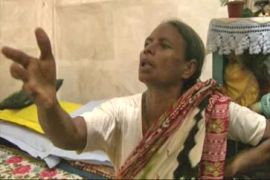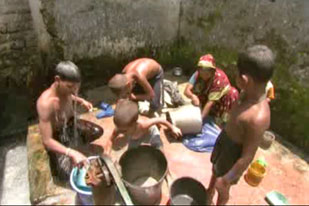Stranded in Bangladesh
Al Jazeera looks at the plight of the Bihari people.

 |
| There are just four wells in the whole of the Geneva camp |
The United Nation Universal Declaration of Human Rights states every person has a right to nationality, but an estimated 11 million people across the world do not enjoy that status.
Sohail Rahman, reporting for Al Jazeera, travelled to Bangladesh, where for 60 years about 300,000 Biharis have been stranded.
Thousands of people live in the Geneva camp in Dhaka, crammed into an area smaller than a football pitch.
The Bihari, known locally as “stranded Pakistanis”, have lived in overcrowded camps like this for more than 35 years.
| Video Link |
Conditions are dismal, sanitation is poor and clean water is limited – there are just four wells in the camp.
Families are frequently forced to share their living quarters with animals.
They have no rights, limited job options and few economic prospects and because the people of the Geneva camp exist in a legal limbo, it is difficult to see a better future.
The camp’s leaders argue that their plight has been ignored.
Shoukat Ali, of the Stranded Pakistanis General Repatriation Committee, told Al Jazeera: “We have been feeling that we have no identification, no proper citizenship, and for this we are in great trouble.
“We [have] requested the election commissioner and the government of Bangladesh to testify or justify our status, on what ground we are here. Either we are Bangladeshi or we are stranded Pakistani[s].”
Little comfort
| Who are the Biharis? |
|
In 1947, at the time of the partition, they moved to what was then East Pakistan. When civil war broke out between the East and West, the Biharis sided with the West. In 1971, East Pakistan became the independent state of Bangladesh. Bangladesh refused Biharis citizenship because they had “supported the enemy”. Pakistan denied them permission to emigrate, fearing a massive influx could destabilise the country. Between 240-300,000 Biharis still find themselves in legal limbo. They live in 65 overcrowded camps, with poor sanitation and shortages of running water. Source: Refugees International |
But the governments of Pakistan and Bangladesh have refused to take responsibility for the Bihari.
The Pakistani government believes it fulfilled its obligation to the Biharis by allowing 170,000 to emigrate between 1974 and 1982.
Islamabad says that the generation of Bihari born after 1971 are Bangladesh nationals, with a right to vote there.
That offers little comfort for those living in Geneva camp.
One resident, Bhanu, remembers moving to the camp with her family.
She showed me an 8ft by 8ft room – the standard allocation when they came to Dhaka – where three generations of her family have lived.
Bhanu said she dreams of returning to Pakistan.
She said: “What am I meant to do? My children have become bad. If my son [was] in Pakistan, we would have educated him and made him a scholar, my son would not have turned out bad.
“We have been stranded here. We want to live in our country, so we can say ‘this is my country.’ Here, who would we say that to?
“[We have] no place, no land, but they say to us ‘Bangladesh is our country’.”
The government recently granted citizenship to 10 Bihari, prompting some hope that the authorities might tackle the problem.
But Bangladesh’s caretaker government has made less welcome overtones towards demolishing the camp, and another 69 camps around the country.
Their removal, the government hopes, would force the Biharis to reintegrate into society but it would not, though, help to define their true status.
The only school in Geneva camp is funded by a small charity. It teaches just 360 out of the nearly 10,000 children that live there.
Those 360 are the lucky ones – by learning English and Bengali, as well as Urdu, their future has some promise.
Hope for the Bihari population lies with the younger generation.

